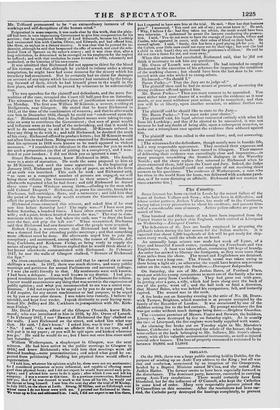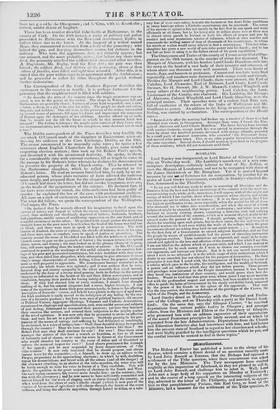IRELAND.
On the 18th, there was a large public meeting held in Dublin, for the purpose of sending up an Anti-Tory address to the King ; but all was riot and confusion, occasioned by an irruption of the Orangemen, headed by a Baptist Minister named 14I'Crea, and the noted John Judkin Butler. The former seems to have been especially forward in the disturbance. The dominant party, however, succeeded in carrying strong Anti-Tory resolutions. There would certainly have been bloodshed, but for the influence of O'Connell, who kept the Catholics in some kind of order. Many very respectable persons joined the O'Connellites on this occasion. After the resolutions had been car- ried, the Catholic party destroyed the hustings completely, to prevent their bet' g it.ed by the Oraegemen ; i rid .1, Tree, with hi: disorderlies, retired, amidst shouts of laughter.
There has been another dreadful tithe-be ttle at Ratheormac, in the comity of Cork. On the 18th instent, a atty of militery and police proceeded to Rathcormae with the Revel end Archdeacon Ryder, to .eollect tithes due to the latter. At the haggerd of a widow named Ryan, they encountered resistance from a leafy of the peasantry ; who barred the gate, and fancying themselves secure, hid defiance to the
Who were the aggressors, does net certainly appear ; but one account, and the most probable, states, that before any shots were tired, the peasantry attacked the soldiers with s toees and other missiles. .A Magistrate, Mr. Begby, read the Riot Act ; the gate was then forced ; the soldiers fired, and thirteen (LI the peasantry, eleven of them uthers rf families, were had, and eight more wounded. After this, it is etated that the poor widow came to an agreement with the Archdeacon ; sad be proceeded to collect Isis tithes throughout the parish without further niolestution.
The Correspondent of the Cork Southern Reporter describes the excitement in the country as terrific : it is perhaps fortueate for the peasantry that the neighbour hood is filled with soldiers.
To describe the state of the country since the tragic occurrence was en- :lewd, is not in the power of the svriter. The shops in Watergrass.hill and Hatheormac are generally closet businesa of every kind suspended—not a cow, a horse, a sheep, or a pig to be seen for miles. The people are dark and sullen, desperate and reckless. One old man, in the presence of the writer, surrounded by several Stores of peasants, fell upon Ida knees and imprecated the vengeance of Heaven upon the destroyers of his children. Another offered up an oath, that he would not die till the biota' in which he that moment knelt was avenged ! The feeling is intense; the people quite careless of their lives; they are incommunicative, and, with very few exceptions, were observed sot to shed a tear."
The Dublin correspondent of the Times describes very forcibly tile ese which O'Connell made of the slaughter at Rathcormac, when ad-
iressing his audience at the Corn Exchange, Dublin, on the 19th. The orator commenced in an unusually calm voice ; be spoke a few sentences about English Chancellors for Ireland; gave some details respecting election matters; then took up Sir Robert Peel's speech, and dissected it with his accustomed dexterity. He spoke, in short, for a considerable time with external coolness, till at length he came to
the passage in Sir Robert's letter wherein he declares his determination to preserve the property of the Church entire. Then he referred to the Ratheormac slaughter, which he culled the postscript to Sir Robert's letter. He read an account furnished him, he said, by an un- educated person, whose plain narrative of facts affected the audience most deeply, and prepared them for the eloquent appeal that followed. O'Connell laid down the letter, but did not invoke vengeance, more suo, an the heads of the perpetrators of the outrage. Ile declared that, if the facts were correctly stated, the tithe-collectors had been guilty of murder : he explained the law of the case, with professional coolness. All were on a rack of excitement, anxious to know what would follow. For what did follow, we quote the correspondent of the Wellington- Peel organ, the Times.
"He declared that he scarcely allowed his imagination to dwell upon the • picture of misery and despair to which the eleven wretched families were ex- nosed, thug suddenly and shockingly deprives! of fathers, husbands, brothers, And guardians, amidst scenes of inaddeniug oppression on the one hand, and of vengeful excitement on the other. Ile painted with simple pathos the desolation brought home to the poor man's heat th when the head of the house was laid low n blood, and there were none to speak of hope or consolation. The wild 7‘arnent of kindred, the cries of orphans, the shrieks of widows, were in his ears, and there were none to comfort, none to speak of justice or protection. The eountry around the scene of bloodshed was filled with the wildness of affliction. Crowds came to gaze on the spectacle of horror ; the women returmid to spread alarm, terror, and dismay ; the men looked on in the gloomy silence of despera- tion, still more appalling than the loudest outcry of sorrow. As Mr. O'Cininell zontinued to pourtray the workings of this awful calamity on the sensitive feel- ings of his poor and persecuted countrymen, his voice trembled with deep emo- tion, and often failed him altogether, while attempting to give utterance to some simi le image characteristic of rustic feeling, whose force his popular auditory were so well prepared to appreciate. His countenance became convulsed as he proceeded; his whole frame was agitated ; and it was evident that he com- manded deep and sincere sympathy in the silent assembly that stood around, enchained by the force of a strong mind pouring forth its feelings in the natural imagery so influential on the hearts of his and their fellow-countrymen, and in conclusion, begging their pardon fur having indulged in thinking aloud amongst them. If they had cheered him at every sentence, I should have thought nothing of it, but his natural elotrence had a surer, higher triumph. I saw some of the reporters lay down their pens unconsciously, to listen to his affecting le:scr iption of domestic --rrows, arid beheld tears glisten in the eyes of aged men. An Irish multitude is easily moved to the indulgence of any feeling by the ora- tory of a favourite partisan ; but here were men of political business, old stagers at Political Unions, Aggregate Meetings, Volunteer and Catholic Associations, accustomed to claptraps and speechification, and, even amidst scenes and subjects of real feeling, habituated to command their passions; yet here they betrayed their emotion like novices, and evinced their subjection to the mighty master of the art of agitation. It was now only that he proceeded to strike an effective blow, and torn his art to a profitable account. Suddenly pausing in his por- traiture of the scenes of outrage and suffering he had delineated SO touchingly, he exclaimed, in a voice of indignation= Shall these dreadful doings be repeated
through the country? Must we have no respite from horrors like these ? Sir Robert Peel says they shall continue for ever ! For ever ! Does there exist
amongst the natives of this land a wretch so heartless, so lost to all sense of humanity and of shame, as to raise hie voice in favour of the Government who would. abandon his country to the curse of tithes and of bloodshed to enforce the accursed impost for ever ? ' Loud cheers proclaimed the triumph of his appeal ; and he now responded by fierce denunciations, of the tithe-traitors.' It now only remained that be should propose and obtain instant leave for the committee,—i. e. himself, to draw up an address to the People, preparatory to the approaching elections; in which he will, doubtless, repeat his denunciations, and brand with all the odium (and all the danger) of
the character attaching to an abettor of the tithe-murders, the voter Who will be hardy enough to raise his voice in favour of a Tory candidate. This will decide the questiou in the great majority of elections in the South and West.
On such trying occasions, his movers never forsake I : on the contrary, they rise with the emergency ; and he now seems to have sufficiently committed and nerved himself tier the work of ringing such an alarm through the country, as
when read from the altars of each Catholic chapel (which is now part of the routine of his system of agitation) will vibrate through the hearts of the seven millions, and bring the effective majorities, through hatred to tithes, or a salu-
tary fear of their own safety, beneath the banners of the Anti.Tithe candidates at every hustings where a Catholic ounstitueney can be mustered. The secret of his success in agitation lies not merely in the fact that he can speak and write efficiently at all times, but in his being able to induce above two or three men in almost every parish in Ireland to back his efferts of tongue and pen by another and more mysterious species of influence, which at once reaches and commands the willing assent of tees of thousands of his countrymen, to whom his words or wishes would never otherw:se find a conveyance. This last tithe- slaughter has green a new world of anti. tithe power into his heeds; and he has not lost an hour in using it to the fullest extent of his great capabilities."
The Orangemen and Tories of the county of Tyrone assembled at Dun- gannon on the 19th instant, to the number of about five thousand. The Marquis of A hereorn, with his brother Lord Claude Hamilton, rode into the town at the head of a vast body of their tenantry and retainers, of whom about one thousand were well mounted. There were bands of music, flags, and banners in profusion. Cannon and muskets were fired repeatedly, and numbers were decorated with orange scarfs and ribands. Besides the Marquis and Lord Claude, there were present, the Earl of Caledon, Lord Alexander, Earl of Belmore, Lord Corry. Lord Castle Stewart, Sir H. Stewart, Mr. J. W. Maxwell, Colonel Wingfield, and many others of the neighbouring gentry. Lord Caledon, the Lord. Lieutenantof the County, was chairman. His Lordship, the Marquis of Abercorn, Colonel Wingfield, and Lord Claude Hamilton, were the principal orators. Their speeches were of a violent high Tory cast, full of exultation at the return of the Duke of Wellington and Mr. Goulburn to power. An address to the King, in' accordance with this feeling, was carried by acclamation. The correspondent of the Herald says- " Immediately after the meeting had broken up, a number of those wiio had attended were sworn in Orangemen. Amongst them were, I heard, the Mar- quis of Abervorn and Lord Claude Hamilton. The latter having been invested with various insignia, orange scarf, Ste. was carried in procession through the town by about one hundred persons, decorated with orange ribands, preceded by a small party of amateur musicians, who executed ' the Protestant boys,' and several other party tunes. Five or six other popular favourites underwent the same ()imitation. Several shots, I should mention, were fired in the progress of these ovations; which did not terminate until dusk."

















 Previous page
Previous page